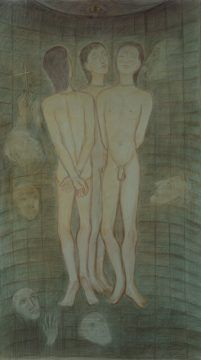Brian Evenson at Music & Literature:
 This is not to say that Klossowski was standoffish. One of the interesting things about him is that once you finally notice him you begin to see his shadowy presence everywhere in twentieth-century French culture. He was, for instance, an early French translator of Walter Benjamin—as well as Wittgenstein, Heidegger, and Kafka, among others. When very young, he was a secretary for André Gide and appears semidisguised as a character in Gide’s novel The Counterfeiters, a novel he appears to have helped edit and for which he also made illustrations (which were turned down for being too overtly erotic). The older brother of the painter Balthasar Klossowski de Rola, better known as Balthus, Klossowski was an artist himself, and his work is at once naïve and pornographically explicit in a way that sometimes references occult texts, mythology, and Klossowski’s own prose. He was a friend of Georges Bataille—and indeed Bataille’s own investigation of erotism might best be read in counterpoint to Klossowski. He was involved marginally with surrealists, spent time in a Dominican seminary, was later involved with the existentialists, and wrote philosophical texts on Friedrich Nietzsche and the Marquis de Sade that were influential for post-structuralism. His book-length economico-philosophical essay La Monnaie vivante (Living Currency) Foucault called “the best book of our times.” Fiction writer, philosopher, translator, and visual artist, Klossowski worked in many modes and media and seemed to touch the lives of many of the literary and artistic figures we now admire. Indeed, once he’s noticed, it’s hard not to suspect he’s lurking even where you don’t see him.
This is not to say that Klossowski was standoffish. One of the interesting things about him is that once you finally notice him you begin to see his shadowy presence everywhere in twentieth-century French culture. He was, for instance, an early French translator of Walter Benjamin—as well as Wittgenstein, Heidegger, and Kafka, among others. When very young, he was a secretary for André Gide and appears semidisguised as a character in Gide’s novel The Counterfeiters, a novel he appears to have helped edit and for which he also made illustrations (which were turned down for being too overtly erotic). The older brother of the painter Balthasar Klossowski de Rola, better known as Balthus, Klossowski was an artist himself, and his work is at once naïve and pornographically explicit in a way that sometimes references occult texts, mythology, and Klossowski’s own prose. He was a friend of Georges Bataille—and indeed Bataille’s own investigation of erotism might best be read in counterpoint to Klossowski. He was involved marginally with surrealists, spent time in a Dominican seminary, was later involved with the existentialists, and wrote philosophical texts on Friedrich Nietzsche and the Marquis de Sade that were influential for post-structuralism. His book-length economico-philosophical essay La Monnaie vivante (Living Currency) Foucault called “the best book of our times.” Fiction writer, philosopher, translator, and visual artist, Klossowski worked in many modes and media and seemed to touch the lives of many of the literary and artistic figures we now admire. Indeed, once he’s noticed, it’s hard not to suspect he’s lurking even where you don’t see him.
more here.
